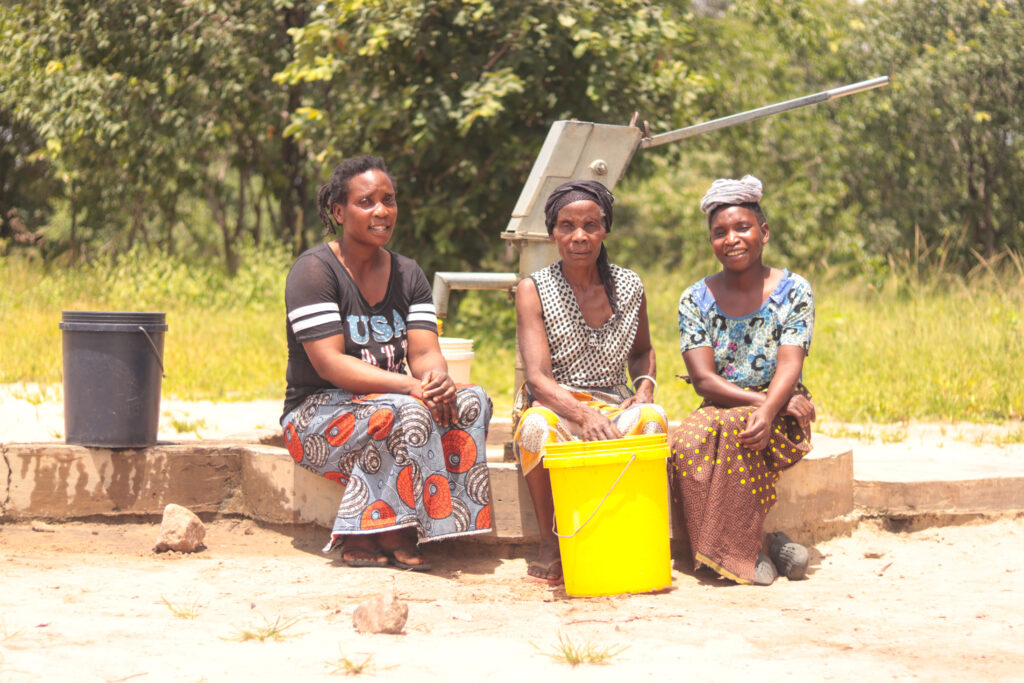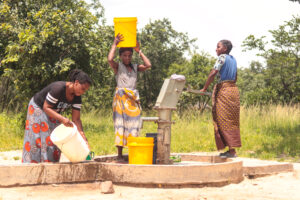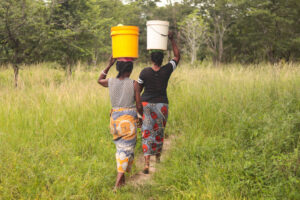In Zambia’s rural landscapes, access to clean and safe water still remains a daily challenge. Many communities depend on unprotected water sources—often shared with livestock—that pose health risks and require long walks, particularly for women and children. But in the Bunda Bunda Chiefdom, this is changing, thanks to the efforts of communities involved in BCP’s Lower Zambezi REDD+ Project (LZRP).

Through BCP’s innovative conservation program, local communities like Kabandi are seeing real-world benefits, including the provision of safe water through strategically placed boreholes. These achievements demonstrate how REDD+ (Reducing Emissions from Deforestation and Forest Degradation) can deliver not just environmental benefits, but powerful improvements in human well-being and rural resilience.
In the Namanongo Zone of Bunda Bunda Chiefdom, the LZRP—implemented by BioCarbon Partners (BCP)—has funded the drilling of 13 boreholes since the project’s inception. These boreholes now serve nine villages, providing year-round access to clean water.
The funding comes from Conservation Fees, which are incentive-based payments connected to how well communities help conserve critical ecosystems like the Rufunsa Conservancy, a key protected area within the REDD+ landscape.
Our projects represent a powerful shift in conservation thinking: communities are not just stakeholders—they are stewards, and their efforts are recognized with infrastructure that directly improves lives.
Before the Kabandi Community Borehold was drilled in 2021, families in Kabandi relied on the distant Musanse stream, which was prone to contamination and drought.
Here’s what residents of Kabandi had to say:
Grace Tubalimine – From Risk to Relief
“Before this borehole was drilled, we used to fetch water from Musanse stream. The water was shared with animals, which led to contamination and posed a health risk to us. We are thankful for this borehole because we now have access to clean and safe drinking water.”
Nelly Chikweleti – Time Saved, and Dignity Restored
“On a daily basis, we would walk about 8 km to Musanse stream to fetch water. It was very tiring and time-consuming. This borehole has made life easier. Now we can use the time saved to do household duties and help prepare our school-going children in the morning.”
Precious Tembo – Thriving Livestock Gives Us Hope
“Our livestock used to suffer when Musanse River dried up due to climate change. I lost a lot of animals to drought. Now, my animals have water all year round from this borehole. I’m so grateful. My livestock are thriving, and I’m motivated to continue protecting the forest because I’ve seen the benefit through this borehole.”
The Kabandi borehole is a testament to how REDD+ benefits extend beyond trees and carbon credits. According to UNICEF, In Zambia, an estimated 67% of rural communities have access to safe drinking water. In many areas, women and children spend hours daily fetching water. This is time that could be used for farming, education, or rest. Having to travel far distances often means starting before daylight breaks, or returning once the sun has set, putting them at risk of wild animals or other potential dangers.
By linking conservation success to tangible infrastructure development, the Lower Zambezi REDD+ Project is delivering wide-reaching benefits for rural communities. It is improving public health through access to clean water, reducing the burden on women and girls who often travel long distances to fetch water, and enhancing livestock and agricultural productivity by providing a reliable water source year-round. Most importantly, these benefits are strengthening community motivation to protect natural resources, as residents increasingly see the direct connection between conservation efforts and improved quality of life.
The Lower Zambezi REDD+ Project is not just safeguarding forests like the Rufunsa Conservancy—it is creating a powerful, integrated model where carbon, community, and conservation work in harmony. The model creates a sustainable cycle of empowerment: forests are preserved, carbon emissions are reduced, and the resulting carbon finance is reinvested into essential community priorities like clean water, healthcare, and education. As a result, communities become stronger and more resilient, and their commitment to conservation deepens, securing both environmental and social benefits for generations to come.
BCP’s LZRP currently supports a total of 28 WASH projects in Bunda Bunda Chiefdom, while our larger project, the Luangwa Community Forests Project in Eastern and Lusaka Provinces, supports a total of 192 WASH-related projects.
BCP’s work in Kabandi and across Bunda Bunda Chiefdom showcases how nature-based solutions can go far beyond carbon accounting—they can uplift lives. Clean water access is a basic human right.
 Through REDD+, Zambia is building a future where rural development, climate resilience, and biodiversity protection work together, and communities like Kabandi lead the way.
Through REDD+, Zambia is building a future where rural development, climate resilience, and biodiversity protection work together, and communities like Kabandi lead the way.
📌 Learn More
🔗 BCP Conservation Impacts
🔗 Lower Zambezi REDD+ Project
🔗 UNICEF Zambia – Rural Water Access
